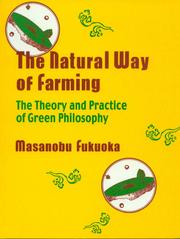Check nearby libraries
Buy this book

Doing nothing, being nothing, becoming nothing is the goal of Fukuoka's farming method, an approach to agriculture which he has pursued for over forty years with resounding success. With no tillage, no fertilizer, no weeding and no pesticides he consistently produces rice, barley, fruit and vegetable crops that equal or exceed the yield per acre of neighboring farmers who embrace modern scientific agriculture. The basis of his philosophy is that nature grows plants just fine without our interference so that the most practical approach is to get out of the way. In the course of explaining his reasoning and methods, this do-nothing farmer delivers a scorching indictment of chemical agriculture and the human assumption that we can improve on nature. He explains the beneficial role of insects and plants usually characterized as pests, the fallacy of artificially boosting fertility with petrochemical concoctions, the logical error implicit in the use of farm machinery or draft animals, and why pollution is an inevitable result of misguided attempts to improve on nature. Calculation of the energy input versus the caloric output of various farms results in the surprising discovery (perhaps it shouldn't be) that (minimal) human labor is the most efficient way to produce food. Draft animals add more work and more energy input, small scale machines compound the problem and large scale mechanized agriculture proves to be a vast waste of energy. He calls modern American farmers "subcontractors of the oil industry," and claims that traditional Japanese farmers on 3-5 acres achieve a real net income higher than American farmers on 500-700 acres. (A skeptical friend of mine wondered if Japanese farm price supports were a factor here. Obviously a complex issue, that, but the declining economic viability of petro-chemical farming is obvious when we note that the onslaught of monster tractors and oil based fertilizers and pesticides has paralleled the collapse of the family farm. The author, to his credit, rejects any artificial manipulation of food prices and believes they should naturally be more or less the same worldwide.) Nor is this text pure philosophy, including as it does specific practical advice on the transition from scientific to natural methods. Crop rotation programs for cold or warm climates, and a ten year rotation system for grain and vegetables make this a practical manual for husbandry. As Fukuoka eloquently suggests, the universe is a circle returning to nothing. Nothing is the most profitable object of our meditations. Doing nothing is simply going with the flow. (See also his "groundbreaking" (literally) ONE STRAW REVOLUTION, Other India Press; 1992)
Check nearby libraries
Buy this book

Subjects
Organic farming, No-tillage, JapanShowing 1 featured edition. View all 1 editions?
| Edition | Availability |
|---|---|
|
1
The natural way of farming: the theory and practice of green philosophy
1985-10-01, Japan Publications, [Distributed in the United States by] Kodansha International/USA through Harper & Row
- Rev. ed.
0870406132 9780870406133
|
aaaa
Libraries near you:
WorldCat
|
Book Details
Edition Notes
"This is a translation, with minor revisions, of Shizen Noho, first published in Japanese in 1976."--P. [277].
Includes index.
Classifications
The Physical Object
ID Numbers
Community Reviews (0)
Feedback?History
- Created October 16, 2008
- 9 revisions
Wikipedia citation
×CloseCopy and paste this code into your Wikipedia page. Need help?
| December 17, 2023 | Edited by ImportBot | import existing book |
| August 11, 2022 | Edited by MARC Bot | normalize LCCNs |
| October 30, 2020 | Edited by MARC Bot | import existing book |
| February 18, 2019 | Edited by MARC Bot | import existing book |
| October 16, 2008 | Created by ImportBot | Imported from Oregon Libraries MARC record. |









